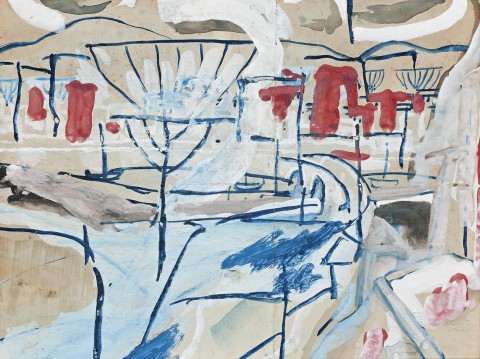LANDSCAPE, c.1955
IAN FAIRWEATHER
gouache on paper on board
33.0 x 43.0 cm
Macquarie Galleries, Sydney
Bunny Williams, Queensland
Helen and David Burke, Sydney, a wedding gift from the above
The Estate of the late David Burke OAM, Sydney
Show of Eights, Macquarie Galleries, Sydney, 13 – 25 February 1957, cat. 17
Landscape, c.1955, gouache on cardboard, 34.0 x 49.0 cm, private collection, Melbourne, illus. in Bail, M., Fairweather, Murdoch Books, Sydney and London, 2009, pl. 103, p. 124
The Hill, 1955, gouache on cardboard, 32.2 x 55.5 cm, private collection, Sydney, illus. in Bail, M., Fairweather, Murdoch Books, Sydney and London, 2009, pl. 104, p. 125
In 1953, after suffering through many years of peripeteias and indignities, Ian Fairweather made his way back to Bribie Island, off the Queensland coast, where he had stayed for over seven months in 1945. It was here, for the first time since the outbreak of the Second World War, that the artist was able to make himself a home, albeit one that could only be described as desolate and isolated. However, this removed existence enabled Fairweather to devote himself entirely to his practice, fed by sketches he had brought with him to the island along with a head filled with vivid memories of his adventures. He was a painter’s painter, and quietly devoted to his cathartic creative process: ‘I paint for myself, and have no sense of mission, nor do I feel any compulsion to communicate, though naturally I am pleased when it seems I have done so’.1
Drawing from memories over twenty years old, this striking abstract landscape probably depicts a riverside view of the city of Huchow (modern spelling Huzhou), in the Yangtze River delta, north of Hangzhou and east of Shanghai. Seeing as Fairweather had the habit of expediting his paintings to Macquarie Galleries devoid of notes, and hence leaving the choice of title entirely up to its directors, this painting carried the rather non-descript title of ‘Landscape’ when it featured in the annual Show of Eights in February 1957. In its complex composite and non-literal form, it could well have been inspired by Huchow, or indeed even its neighbouring cities, Soochow and Foochow, or possibly a summary of all three. These neighbouring cities were all preferred subjects for Fairweather’s paintings both for works executed in China and long afterwards.
Using a visual vocabulary and syntax that had been brought to maturity in isolation, Fairweather’s paintings of the 1950s move towards a complex linear calligraphic abstraction. Landscape, 1955, is amongst Fairweather’s most expressive, gestural and immediate visual recollections – the successive layers of wash, inky swathes and strong lines boldly placed with stiff brushstrokes all converge to show a shifting scene of a riverbank bordered by teetering constructions. The psi-shaped vertical structures dotted strategically throughout this landscape could be a number of real or imagined objects – supports for banners, telegraph poles. Tangled and haphazard, this painterly representation of an early twentieth century Chinese landscape is evocative and reveals Fairweather’s nostalgia, propelling him to clutch at fleeting and approximate visual recollections.
As the pale body of water anchors the centre of the composition, it is bordered by loosely drawn symbolic landmarks, from the arched bridge, curious vertical structures, the schematic boats, ramparts and roofs, all jostling for attention and switching smoothly from background to foreground. Informed by distant impressions of Chinese calligraphy, Aboriginal rock art and European Post-Impressionism, Fairweather’s drawings and paintings of the 1950s retain a tenuous connection to figurative representation, unfolding and accumulating in fused layers over the support’s surface like a stream of consciousness. Perhaps this stream of consciousness was what inspired the late Robert Hughes to characterise Fairweather’s style of painting as a kind of personal reflection: ‘disciplined, relaxed poise that is born of self-knowledge […] the act of painting becomes a way of meditation’.2
1. The artist quoted in Abbott-Smith, N., Ian Fairweather: Profile of a painter, University of Queensland Press, Brisbane, 1978, p. xi
2. Hughes, R., The Art of Australia, revised edition, Penguin Books, Victoria, 1970, p. 290
LUCIE REEVES-SMITH
